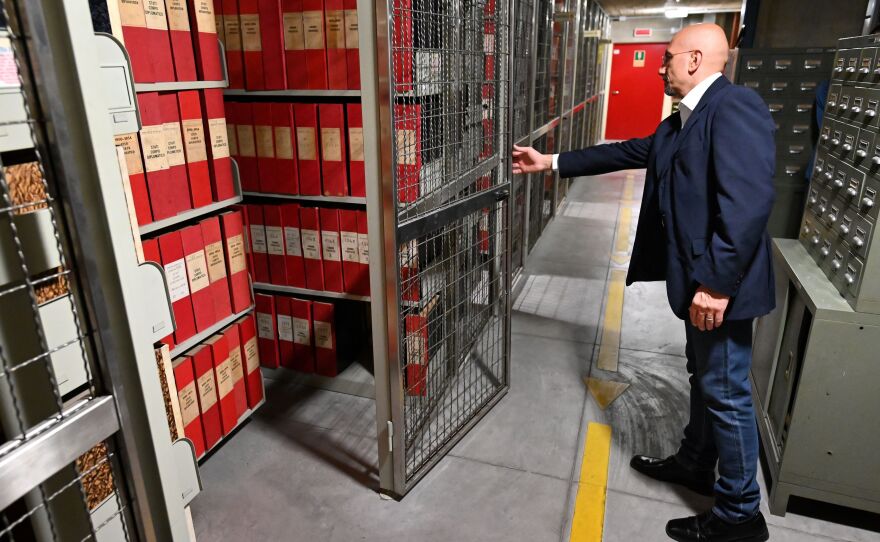After decades of pressure from historians and Jewish groups, the Vatican on Monday began allowing scholars access to the archives of Pope Pius XII, the controversial World War II-era pontiff.
Roman Catholic Church officials have always insisted that Pius did everything possible to save Jewish lives. But he remained publicly silent while some 6 million Jews were killed in the Holocaust.
More than 150 scholars have applied to study documents covering his papacy, which lasted from 1939 to 1958. Typically, the Vatican waits 70 years after the end of a pontificate to open its archives to scholars.
Speaking to reporters on Feb. 20, the Vatican's chief librarian, Cardinal José Tolentino Calaça de Mendonça, said all researchers, regardless of nationality, faith and ideology, are welcome.
"The church is not afraid of history," he said, echoing Pope Francis' words when he announced his intention to open the Pius XII archives a year ago.
Jewish groups welcomed the opening of the archive. "In inviting historians and scholars in to publicly access the Vatican's World War II archives, Pope Francis is demonstrating a commitment to learning and airing the truth, as well as to the significance of Holocaust memory," World Jewish Congress President Ronald S. Lauder said in a statement.
Johan Ickx, a Vatican archivist, says scholars will have easy access to the files.
"We have now passed 1 million and 300,000 documents that are digitalized and interfaced with an inventory for it, to help the researchers to go quickly," he says.
Those researchers have been waiting a long time. A 1963 German play, The Deputy by Rolf Hochhuth, sparked questions about Pius' wartime role and accused him of complicit silence in the Holocaust. The Vatican's attempts to beatify him are stymied by still-vivid memories in Rome of his behavior toward the city's Jews during the Nazi occupation.
A plaque on the wall outside a military college in Rome recalls the roundup of 1,259 Jews. It reads: "On 16 October 1943 entire Jewish Roman families ripped from their homes by the Nazis were brought here and then deported to extermination camps. Of more than 1,000 persons, only 16 survived."
The location is just 800 yards from St. Peter's Square — "under the pope's very windows," as Ernst von Weizsacker, then serving as Germany's ambassador to the Vatican, reported back to Hitler.
Brown University's David Kertzer has written extensively about popes and Jews. He won the 2015 Pulitzer Prize for his book The Pope and Mussolini: The Secret History of Pius XI and the Rise of Fascism in Europe, about Pius XII's predecessor, and has reserved a desk in the Vatican archives for the next four months.
Kertzer says a lot is known about what Pius XII did. Much less is known about internal deliberations during the war years in the Vatican.
"We know [Pius XII] didn't take any public action," he says. "He didn't protest to Hitler. But who within the Vatican might have been urging him to do so? Who might have been advising him caution? That's the kind of thing I think we'll find out, or hope to find out about."
Like many church historians, Massimo Faggioli, who teaches theology at Villanova University, is also curious about Pius' role after World War II, during the Cold War. In particular, he wonders, did Vatican officials intervene in Italian elections in 1948, when there was a real possibility of a Communist Party victory?
"I would be curious to know so what kind of communication there was between the [Vatican] Secretariat of State and the CIA," he says. "Pope Pius was certainly convinced that he had to defend a certain idea of the Christian civilization in Europe against communism."
Kertzer is certain the Catholic Church was horrified by the Holocaust. In fact, several thousand Jews found refuge in Catholic convents in Italy. But what he hopes to understand better from the Pius files is the role played by the church in demonizing Jews.
"The main purveyors of vilification of Jews for many decades was not the state, it was the church," he says. "And it was vilifying Jews right up through the '30s and right up to the beginning of the Holocaust, if not into it, including Vatican-related publications."
This, Kertzer says, is what the Vatican needs to come to terms with.
Copyright 2020 NPR. To see more, visit https://www.npr.org.






